Metafiction, Supernatural and the Double Death of the Author

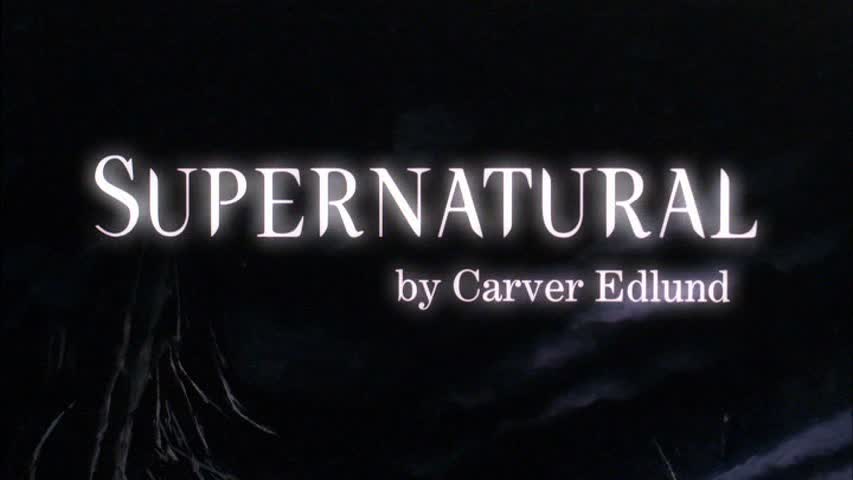
Put on your thinking caps and check out this fascinating article by guest author PurpleHairedWonder.
How the Power Shifts in the Show Represent the Evolution of Modern Storytelling
Modern storytelling spans many mediums beyond print. Television shows and films tell increasingly expansive, involved stories with complex characters that can arguably rival even the traditional greats of novels. Meanwhile, metafiction has become particularly popular in recent years. It has helped shape narratives in new, imaginative ways, exemplifying experimental modern storytelling. Novels like Nabokov’s Pale Fire, a fictional collection of criticism on a fictional poem, and films like Stranger Than Fiction, which features a story about a man who finds out his life is being written as a novel in which he is fated to die, are prime examples.
And then there is Supernatural, with its infamous fourth-wall-eviscerating episodes.
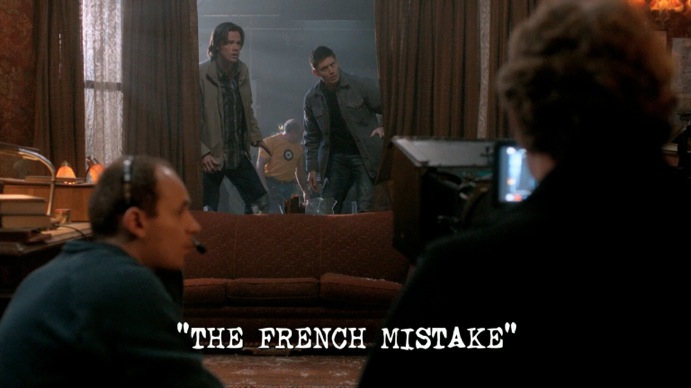
In an era of social unrest and media digitization, the identity of narrative has come under question. Roland Barthes’ seminal lit theory essay “The Death of the Author” declares the death of the author’s power over the narrative and instead invests that power in the reader. But we can take that a step further. If the reader owns writing, then the audience owns the narrative, meaning that popular entertainment—the embodiment of modern storytelling—is the new frontier. And the prevalence of metafiction, such as in shows like Supernatural, is one way that shift has become apparent.
What is metafiction?
So what is metafiction? This is fiction, according to literary critic Patricia Waugh in Metafiction: The Theory and Practice of Self-Conscious, that “self-consciously and systematically draws attention to its status as an artefact in order to pose questions about the relationship between fiction and reality.” Or, in non-academic-ese, metafiction is fiction that is not only aware of its construction as a fiction, but also makes outright reference to that fact. The goal is to make the reader uncomfortable and question the line that exists between the fictional realm within the text and the world he or she inhabits.
The rise of metafiction
Self-reflexive fiction has become increasingly prevalent since the 1960s. Many critics see this as a reaction to political upheaval, as societal unrest leads to questions about the self, about natural order, and about culture. Metafiction’s rise in popularity has also coincided with the technology-based evolution of storytelling. As film and television have become staples of the American entertainment industry, the craft of storytelling has had to shift to accommodate new mediums.
And metafiction has appeared across these mediums through this shifting landscape. Though metafiction has mainly been defined in the literary realm, it is simply, according to Waugh, “an elastic term which covers a wide range of fictions.” And, as the evolving narrative indicates, fictions can be found across many mediums and thus described as metafictional. It is the process, not the medium, that matters. In essence, “the lowest common denominator of metafiction is simultaneously to create a fiction and to make a statement about the creation of that fiction.”

In the tradition of fiction about fiction, filmmakers instead “film that they film the filming” and “television shows are increasingly concerned with television shows,” writes critic Winifried Noth in “Self-Reference in the Media.” Television shows about people who make television shows? Films about filmmaking? We’ve all seen them.
The media has been enveloped by the intertextuality prevalent in literature, preferring to make allusions over original work. But that is not to say that there is nothing original in the media anymore. Rather, Noth adds, “self-reference is at the root of every medium. Each individual medium has a historical precursor to which it refers back in media history.” And this is true of literature as well, which habitually alludes to older works, particularly the Bible and those of Shakespeare.
Intertextuality and cinema: “Hollywood Babylon” in a nutshell
Like literature before it, “[p]opular entertainment constructs a world of complex allusions to the fabrications of the entertainment industry itself. Nowhere is intertextuality more manifest than, for example, in the structures of cinema,” writes Vincent Colapietro in “Distortion, Fabrication, and Disclosure in a Self-Referential Culture.” This brings to mind Supernatural’s second season episode “Hollywood Babylon,” which was the show’s first foray into the metafictional realm.
In this episode, Sam and Dean work a job on a Hollywood film set. Film buff Dean takes on the job of a P.A., which Sam assumes are “kind of like slaves.” The episode goes on to poke fun at everything from the actors—referencing Jared’s previous role on Gilmore Girls—and crew—actual executive producer McG is an over-the-top director for the film—to logic of the show—questioning salt as the condiment of choice for dispelling ghosts or why ghosts appear for summoning rituals—and criticisms from the network “suits”—producer Brad in the episode complains the horror film is too dark and depressing, echoing complaints series creator Erik Kripke received about Supernatural.
This episode teems with intertextuality, meshing allusions to the industry that spawned the series and the people working on the series with a typical monster-of-the-week type episode in which Sam and Dean hunt a supernatural entity without advancing the overall plot arc of the season. It is a television episode—cinematic narrative—about filmmaking. Season three’s “Ghostfacers” is also a direct parody of reality shows like Ghost Hunters, making it another episode about television and, therefore, intertextual.
So where are we going with this? Why should we care about self-referential fiction, especially when it has to do with our favorite show? Because, by taking Barthes’ theory of the death of the author, we see a shift in power dynamics. And in metafictional narratives, this shift happens not just once, but twice. When it comes down to it, the power of metafiction comes from the fact that, regardless of the medium, these types of narratives give power to the characters and the readers, actually representing a double death of the author.


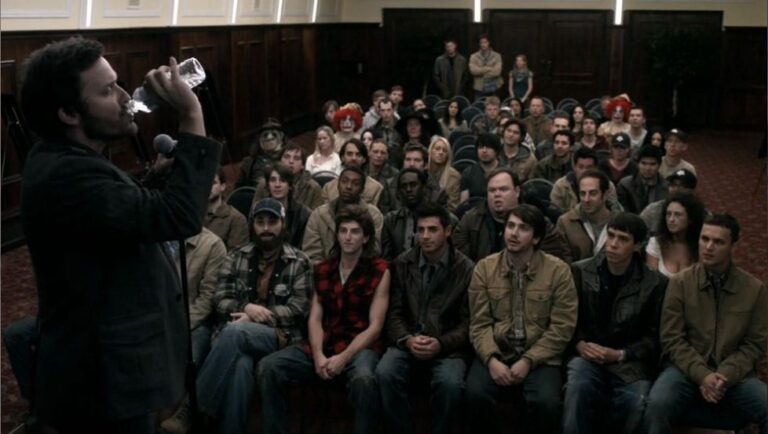
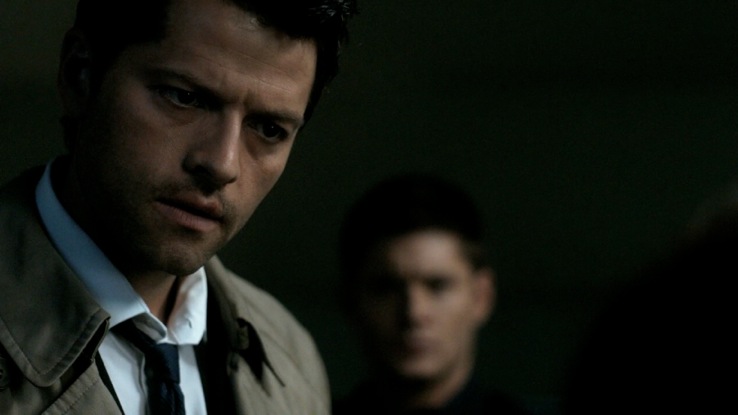
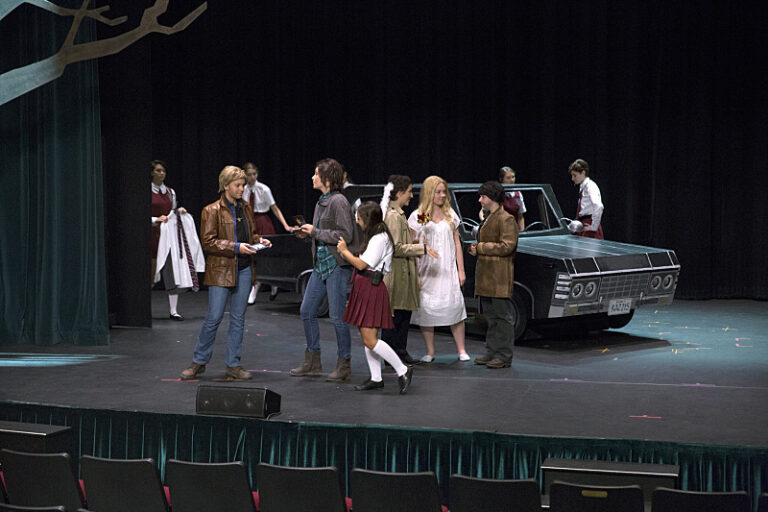

Thanks Purplehairedwonder!
Fascinating article and something to think about.
Thank you! One of my favorite things about Show is how many levels it can get you to think at. It always seems like there’s another level no matter how far you go. I have a lot of fun exploring it as I can.
Purplehairedwonder – Thanks for taking the time to write this. It is heady stuff for sure but…. I really enjoy these types of articles.
Reading this reminded me of one of my favorite books “Simulacra and Simulation” by Baudrillard. If you haven’t already, give it a peek. Seems like something you may enjoy based on your article. This article inspired me to pull it from my bookshelf and start looking at it again. I am putting it bedside and going to give it another read.
Interesting, I’ll definitely check it out. Thanks for the rec!
I actually adapted this article from a much longer essay I wrote for a lit theory class in grad school. I was writing about “Death of the Author” for a metafictional book (Nabokov’s [i]Pale Fire[/i]), film ([i]Stranger Than Fiction[/i]), and TV show ([i]Supernatural[/i], of course). I was just so fascinated by the topic and how well it fit with Show that I delved a bit more into the SPN side.
I know the academic stuff isn’t for everyone, but I think it’s fun to see how we can get into even that with Show 🙂
Well done. I think this era is going to determine much of the stories we see now and in the future. The middle man is largely removed in all forms of media, and I think the “Fourth Wall” that is continually smashed by Supernatural and other shows will eventually disappear or become so transparent it will no longer be necessary.
I loved the point about how the text is kept alive not by the writer’s hand but by the reader’s. Too often, people envision writers in a so-called Ivory Tower aloof from it all. It’s a social activity, and therefore text is born of both writer and reader.
Truly thought provoking.
I think with the rise of social media, the power of the reader/audience is becoming greater and greater, though the evolution is a long-term one. Because Supernatural has a cast and crew so willing and interested in communicating with their fanbase, it seems the perfect case study for “new storytelling” to go with “new media.”
Supernatural is already quirky so the risk of doing something strange or revolutionary is inherent in the material, so I think that makes the reward all the greater–for the people on both sides of the spectrum. Hence the metafictional aspect of the article; a show not so willing to go to such odd places might not have such great luck on the new frontier. It’s a fascinating dynamic to consider.
Glad you enjoyed 🙂
Supernatural — story by committee — it’s doomed!
I like to think of it as a hopeful future, new frontier and all, haha 🙂
You know I have a particular fondness for Barthes and your commentary is insightful about how the show has moved from simple self-reference as comedy to using comedic self-reference as a point of resistance to traditional ideas of authorship.
When I had my students read Barthes’s essay, they all concentrated on the line you quoted about the birth of the reader. I found that interesting because his observations do foreshadow the interactive nature of storytelling in a world that has the technology for immediate feedback. And while many mourn the death of the author, I think the show has embraced it to a large extent. The meta episodes can be viewed, on one level, as a directed conversation with the reader, a conversation that could not have really happened before digital technology. Or at least couldn’t have had the same impact on storytelling.
Great job, Caitlin. It was a pleasure to read.
-Linda
Yes ma’am, writing this made me think of you, haha. Glad you enjoyed 🙂
I do find the concept of the birth of the reader really fascinating, especially since Barthes’ essay predated the digital era that makes all of this possible at all. The death of the author will like yield mixed results with storytelling, but that such risks are even possible to take is rather fascinating to me. And the way Supernatural has, by and large, been successful with it even more so. It’ll be interesting to see what happens with storytelling as everything is digitized. It’s literally a new frontier for storytelling and I see the show as an innovator in that regard.
You might also be interested in the book we just published on Supernatural and its fans, Fandom At The Crossroads. There’s a chapter on breaking the fourth wall that includes the episodes you cited above, along with fans’ (mixed) reaction to having the fourth wall broken and interviews with ‘the author’ himself, Eric Kripke, bringing the reciprocal relationship between fans and the creative side full circle. I love that SPN itself is capable of as many “thinky thoughts” as its always deep-thinking fandom 🙂
Thanks for an interesting read!
I certainly give Fandom at The Crossroads my 5 star endorsement! The link to purchase the book on Amazon is on our Home Page, halfway down on the right side. A must read!
You know, it’s actually on my Amazon Wishlist at this very moment 🙂 I look forward to reading it soon, hopefully. Thinky thoughts about Show are my favorite!
The reader/watcher has been engaged with the author/writer before. Certainly the fans had a lot to do with Friends ending with Ross and Rachel finally getting together. In addition fans of Castle this year are getting itchy for him to get together with Beckett. And of course LOST wherein the fans were getting impatient for the authors/writers to get on with the story is a good example. And all were not pleased at the ending and used the internet to express that.
I think the idea of the birth of the reader is most prevalent with genre shows since we are the ones who usually comment on each episode/chapter of our shows. However, I do feel above all, that the author/writer should still be the god of their book or show, and not the audience. And I think that the writers still rule on Supernatural, otherwise there would not have been that many deaths on the show. They still rule, which is how it should be.
Thanks so much for this. I love having my little brain challenged by this kind of stuff, meaning both your article and metafiction, be it through films, tv or books.
I know the season is almost over (sniff) but I’d love them to do another metafictional show. Maybe next season (she thinks hopefully).